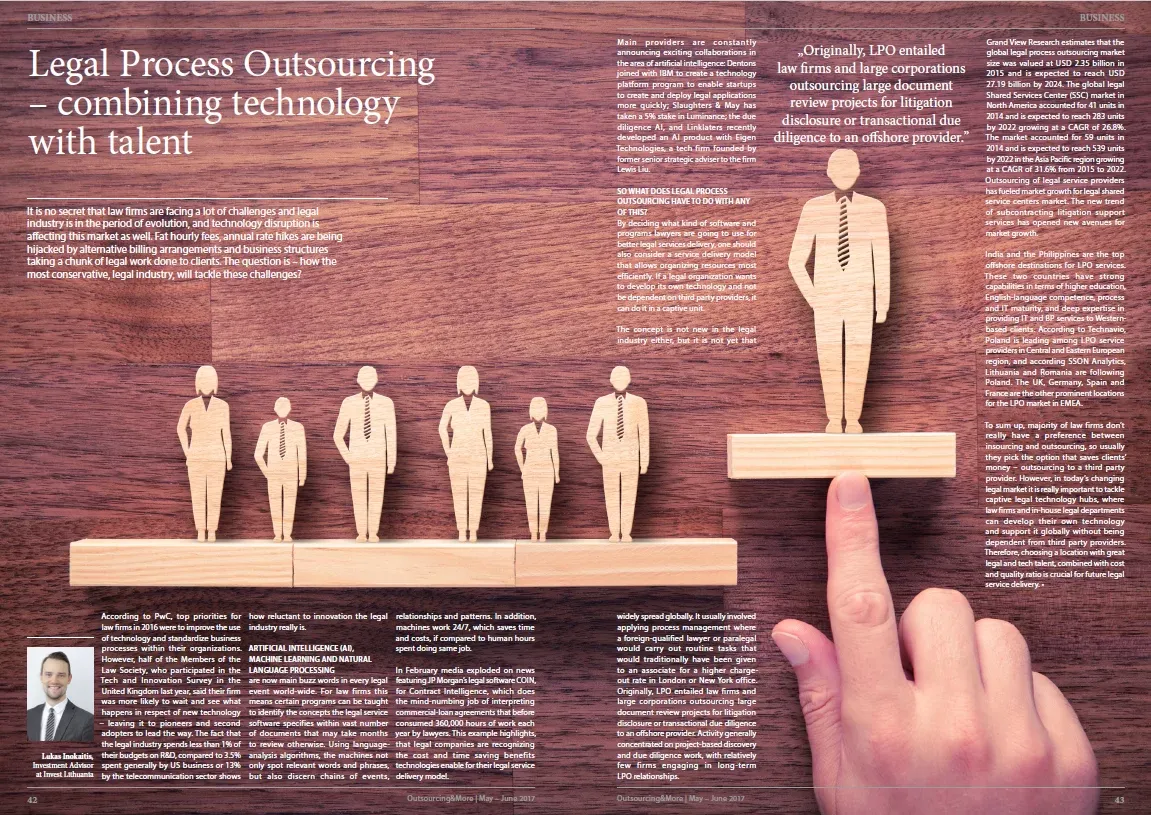It is no secret that law firms are facing a lot of challenges and legal industry is in the period of evolution, and technology disruption is affecting this market as well. Fat hourly fees, annual rate hikes are being hijacked by alternative billing arrangements and business structures taking a chunk of legal work done to clients. The question is – how the most conservative, legal industry, will tackle these challenges?
According to PwC, top priorities for law firms in 2016 were to improve the use of technology and standardize business processes within their organizations. However, half of the Members of the Law Society, who participated in the Tech and Innovation Survey in the United Kingdom last year, said their firm was more likely to wait and see what happens in respect of new technology – leaving it to pioneers and second adopters to lead the way. The fact that the legal industry spends less than 1% of their budgets on R&D, compared to 3.5% spent generally by US business or 13% by the telecommunication sector shows how reluctant to innovation the legal industry really is.
Artificial intelligence (AI), machine learning and natural language processing are now main buzz words in every legal event world-wide. For law firms this means certain programs can be taught to identify the concepts the legal service software specifies within vast number of documents that may take months to review otherwise. Using language-analysis algorithms, the machines not only spot relevant words and phrases, but also discern chains of events, relationships and patterns. In addition, machines work 24/7, which saves time and costs, if compared to human hours spent doing same job.
In February media exploded on news featuring JP Morgan’s legal software COIN, for Contract Intelligence, which does the mind-numbing job of interpreting commercial-loan agreements that before consumed 360,000 hours of work each year by lawyers. This example highlights, that legal companies are recognizing the cost and time saving benefits technologies enable for their legal service delivery model.
Main providers are constantly announcing exciting collaborations in the area of artificial intelligence: Dentons joined with IBM to create a technology platform program to enable startups to create and deploy legal applications more quickly; Slaughters & May has taken a 5% stake in Luminance; the due diligence AI, and Linklaters recently developed an AI product with Eigen Technologies, a tech firm founded by former senior strategic adviser to the firm Lewis Liu.
So what does Legal Process Outsourcing have to do with any of this?
By deciding what kind of software and programs lawyers are going to use for better legal services delivery, one should also consider a service delivery model that allows organizing resources most efficiently. If a legal organization wants to develop its own technology and not be dependent on third party providers, it can do it in a captive unit.
The concept is not new in the legal industry either, but it is not yet that widely spread globally. It usually involved applying process management where a foreign-qualified lawyer or paralegal would carry out routine tasks that would traditionally have been given to an associate for a higher charge-out rate in London or New York office. Originally, LPO entailed law firms and large corporations outsourcing large document review projects for litigation disclosure or transactional due diligence to an offshore provider. Activity generally concentrated on project-based discovery and due diligence work, with relatively few firms engaging in long-term LPO relationships.
Grand View Research estimates that the global legal process outsourcing market size was valued at USD 2.35 billion in 2015 and is expected to reach USD 27.19 billion by 2024. The global legal Shared Services Center (SSC) market in North America accounted for 41 units in 2014 and is expected to reach 283 units by 2022 growing at a CAGR of 26.8%. The market accounted for 59 units in 2014 and is expected to reach 539 units by 2022 in the Asia Pacific region growing at a CAGR of 31.6% from 2015 to 2022. Outsourcing of legal service providers has fueled market growth for legal shared service centers market. The new trend of subcontracting litigation support services has opened new avenues for market growth.
India and the Philippines are the top offshore destinations for LPO services. These two countries have strong capabilities in terms of higher education, English-language competence, process and IT maturity, and deep expertise in providing IT and BP services to Western-based clients. According to Technavio, Poland is leading among LPO service providers in Central and Eastern European region, and according SSON Analytics, Lithuania and Romania are following Poland. The UK, Germany, Spain and France are the other prominent locations for the LPO market in EMEA.
To sum up, majority of law firms don’t really have a preference between insourcing and outsourcing, so usually they pick the option that saves clients’ money – outsourcing to a third party provider. However, in today’s changing legal market it is really important to tackle captive legal technology hubs, where law firms and in-house legal departments can develop their own technology and support it globally without being dependent from third party providers. Therefore, choosing a location with great legal and tech talent, combined with cost and quality ratio is crucial for future legal service delivery.
Author: Lukas Inokaitis, Investment Advisor at Invest Lithuania
Source: Outsourcing&More













